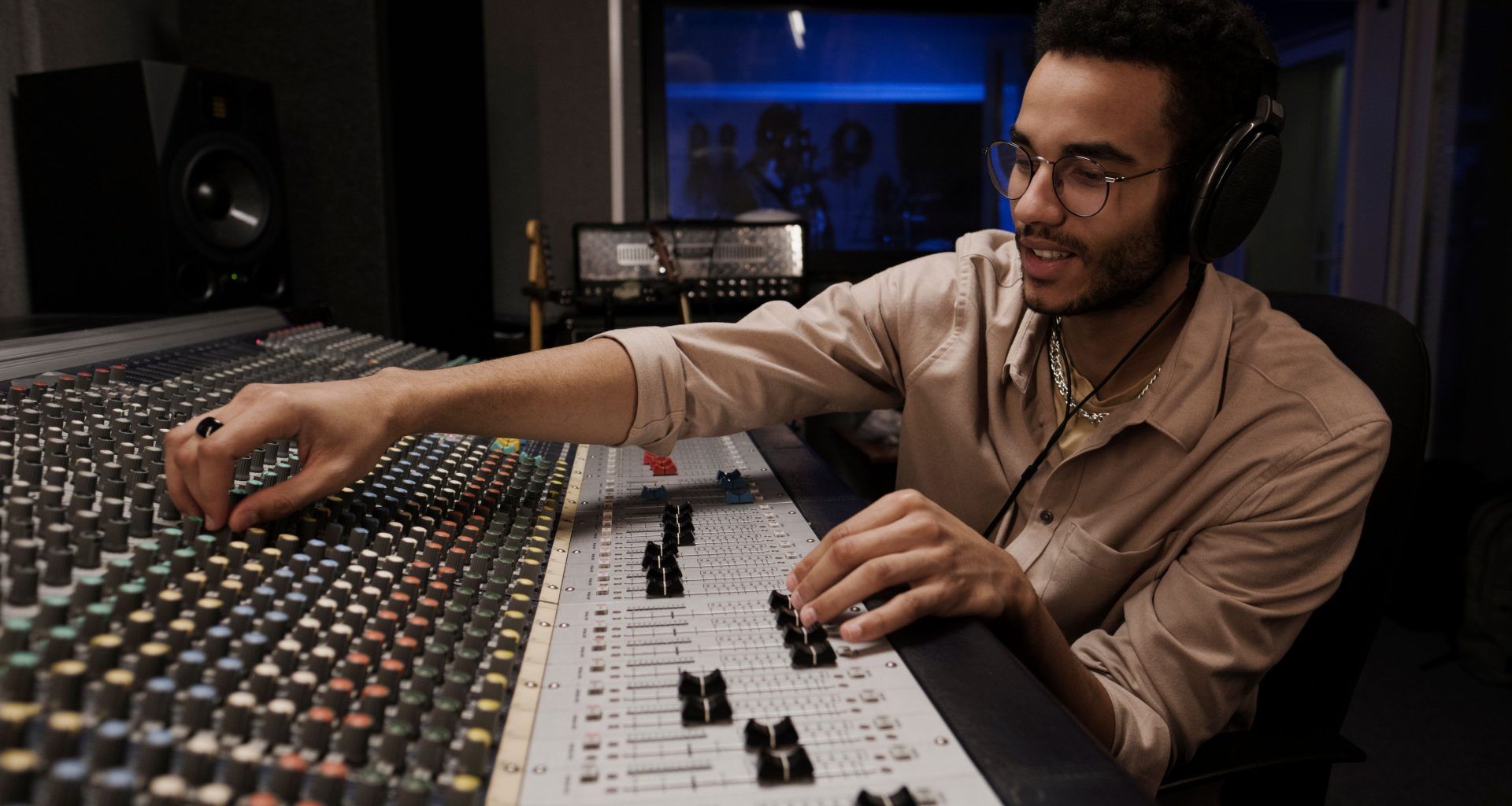In the vibrant world of music, various roles contribute to the creation of the songs we love. Among these roles, the sound engineer stands out as a pivotal player. But what does a sound engineer do in the music industry? This blog delves into the essential tasks and responsibilities of a sound engineer, highlighting their importance in the music production process.
Understanding the Role of a Sound Engineer
A sound engineer, also known as an audio engineer, is a professional who works on the technical aspects of sound during the recording, mixing, and reproduction processes. Their expertise ensures that the final audio product is polished and high-quality, meeting the standards required for commercial release.
Sound engineers play a crucial role in the music industry, working behind the scenes to create the perfect sound that we hear in our favorite songs. They are responsible for manipulating audio elements to achieve the desired outcome, which includes setting up equipment, recording audio, mixing tracks, and mastering the final product.
Key Responsibilities of a Sound Engineer
- Recording
- Setting up microphones and other recording equipment.
- Capturing sound from musicians, vocalists, and instruments.
- Ensuring the quality of the recording by managing levels, dynamics, and clarity.
- Mixing
- Combining multiple audio tracks into a final version.
- Adjusting levels, panning, and effects to create a balanced mix.
- Enhancing the overall sound by adding equalization (EQ), reverb, and other effects.
- Mastering
- Preparing the final mix for distribution.
- Ensuring consistency across all tracks in an album.
- Optimizing audio playback on various devices and platforms.
- Live Sound Engineering
- Setting up and managing sound systems for live performances.
- Balancing sound levels and minimizing feedback during concerts.
- Collaborating with performers to ensure optimal sound quality.
Recording: The Foundation of Music Production
One of the primary duties of a sound engineer is recording. This involves setting up microphones and other equipment to capture the best possible sound from performers. The engineer must have a keen ear for detail, ensuring that each instrument and vocal is recorded clearly and accurately. They work closely with musicians to achieve the desired sound, adjusting microphone placements and settings as needed.
Recording is the first step in the music production process and is critical to the overall quality of the final product. Sound engineers must understand the acoustics of the recording space and select the appropriate equipment to capture the nuances of each performance. They often work in recording studios, but may also record in various other locations, including concert halls, rehearsal spaces, or even outdoors.
Sound engineers must also be adept at troubleshooting technical issues that may arise during recording sessions. This can include dealing with unwanted background noise, equipment malfunctions, or other unforeseen problems. Their ability to quickly identify and resolve these issues ensures that the recording process runs smoothly and efficiently.
The Art of Mixing: Blending Sounds to Perfection
Once the recording phase is complete, the sound engineer moves on to mixing. Mixing is the process of combining multiple audio tracks into a single cohesive piece. This stage involves balancing the levels of each track, adjusting panning, and adding effects like EQ and reverb. A good mix can make or break a song, as it influences the overall feel and impact of the music.
During mixing, the sound engineer uses various tools and software to fine-tune each element of the track. They ensure that no instrument overpowers the others and that the vocals are clear and prominent. The goal is to create a balanced and engaging listening experience.
Mixing is a highly creative process that requires a deep understanding of both the technical and artistic aspects of music. Sound engineers must have an excellent ear for detail, as even minor adjustments can significantly impact the overall sound. They must also be able to work closely with artists and producers to achieve the desired artistic vision.
Mastering: The Final Touch
After mixing, the final step in the production process is mastering. Mastering prepares the mixed track for distribution by ensuring consistency and quality across all playback systems. The sound engineer applies final adjustments to the track, such as compression and limiting, to enhance its loudness and clarity.
Mastering also involves sequencing tracks for an album, ensuring a smooth flow from one song to the next. The sound engineer checks for any discrepancies and makes necessary corrections to achieve a professional and polished final product.
Mastering is a critical step in the production process, as it ensures that the final product sounds good on all playback systems, from high-end audio equipment to standard consumer devices. The sound engineer must have a thorough understanding of audio principles and mastering techniques to achieve the best possible results.
Live Sound Engineering: Bringing Music to Life
Live sound engineering is another critical aspect of a sound engineer’s job. In live settings, the sound engineer is responsible for setting up and managing the sound system to ensure that the audience experiences the best possible sound quality. This involves balancing levels, minimizing feedback, and adjusting settings on the fly to accommodate changes in the performance.
Live sound engineers work closely with performers, understanding their needs and preferences to deliver an optimal live sound experience. They also troubleshoot any technical issues that may arise during the performance, ensuring a seamless show.
Live sound engineering requires a unique set of skills, as it involves managing sound in real-time and adapting to changing conditions on the fly. Sound engineers must be able to think quickly and make adjustments to ensure that the performance runs smoothly. They must also have excellent communication skills to work effectively with performers and other members of the production team.
Essential Skills for a Sound Engineer
To excel in the music industry, a sound engineer must possess a combination of technical skills and creativity. Here are some key skills essential for success:
- Technical Proficiency
- Knowledge of recording equipment, microphones, and software.
- Understanding of acoustics and sound theory.
- Ability to troubleshoot and solve technical issues.
- Attention to Detail
- Keen ear for identifying and correcting audio imperfections.
- Meticulous approach to balancing and blending sounds.
- Precision in applying effects and adjustments.
- Creativity
- Innovative thinking to enhance and shape the sound.
- Ability to translate artistic vision into technical execution.
- Flexibility to adapt to different musical styles and genres.
- Communication
- Effective collaboration with musicians, producers, and other engineers.
- Clear articulation of technical concepts to non-technical team members.
- Responsiveness to feedback and willingness to make adjustments.
Sound engineers must also stay up-to-date with the latest technology and industry trends. This involves continuous learning and professional development, as well as networking with other professionals in the field.
The Importance of a Sound Engineer in the Music Industry
The question, “what does a sound engineer do in the music industry?” can be answered by recognizing their integral role in the production process. Without sound engineers, the quality of music recordings and live performances would suffer. They bring technical expertise and creative insight to ensure that every piece of music reaches its full potential.
Sound engineers also contribute to the overall production process by working with producers and artists to achieve the desired sound. Their ability to balance artistic vision with technical execution is crucial for producing music that resonates with audiences.
In addition to their technical skills, sound engineers must also possess strong interpersonal skills. They often work closely with a variety of people, including artists, producers, and other engineers. This requires effective communication, collaboration, and the ability to work well under pressure.
Challenges Faced by Sound Engineers
Despite their vital role, sound engineers often face several challenges in their work. These include:
- Technical Issues
- Equipment malfunctions and software glitches can disrupt the recording and mixing process.
- Troubleshooting these issues requires quick thinking and problem-solving skills.
- Time Constraints
- Deadlines can be tight, especially for commercial releases.
- Sound engineers must work efficiently without compromising quality.
- Creative Differences
- Balancing the artistic vision of multiple stakeholders can be challenging.
- Sound engineers must navigate differing opinions and find common ground.
- Evolving Technology
- Staying updated with the latest technology and software is essential.
- Continuous learning and adaptation are required to maintain expertise.
Future Trends in Sound Engineering
The field of sound engineering is continually evolving, with new technologies and techniques emerging regularly. Some future trends to watch include:
- Advancements in AI and Machine Learning
- AI-powered tools for mixing and mastering are becoming more prevalent.
- These tools can enhance efficiency and offer new creative possibilities.
- Immersive Audio Technologies
- Techniques like spatial audio and binaural recording are gaining popularity.
- These technologies create more immersive listening experiences.
- Remote Collaboration
- Cloud-based platforms are enabling remote recording and mixing.
- Sound engineers can collaborate with artists and producers worldwide.
- Sustainability in Audio Production
- Eco-friendly practices and sustainable materials are being adopted in studios.
- Reducing the environmental impact of music production is becoming a priority.
Conclusion
In conclusion, the role of a sound engineer in the music industry is multifaceted and essential. From recording and mixing to mastering and live sound, sound engineers ensure that every piece of music is crafted to perfection. Their technical expertise, creativity, and dedication to quality make them invaluable members of the music production team.
So, next time you listen to your favorite song or attend a live concert, remember the skilled sound engineer behind the scenes, making it all sound amazing. The next time someone asks, “what does a sound engineer do in the music industry?” you’ll have a comprehensive understanding of their crucial role.
For further reading, explore these related articles:
- Creating an Impressive Music Industry Resume: A Comprehensive Guide
- Does Age Matter in the Music Industry?
- The Ultimate Guide to Music Industry Conferences: Networking, Learning, and Growing Your Career
For additional resources on music marketing and distribution, visit Deliver My Tune





